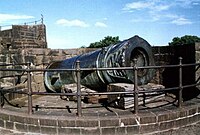Siege of Bijapur
| Siege of Bijapur | ||||||||||
|---|---|---|---|---|---|---|---|---|---|---|
| Part of Mughal–Maratha Wars | ||||||||||
 The legendary "Malik-i-Maidan" cannon is stated to be the largest piece of cast bronze ordnance in the world. |
||||||||||
|
||||||||||
| Belligerents | ||||||||||
| Mughal Empire | Adil Shahi Dynasty | Maratha Empire | ||||||||
| Commanders and leaders | ||||||||||
|
Aurangzeb Muhammad Azam Shah Shah Alam Abdullah Khan Bahadur Firuz Jang Dilir Khan Ruhullah Khan Syed Mian Qasim Khan Khanzada Khan Kilich Khan Bahadur Ghazi ud-Din Khan Feroze Jung I Jahan Khan Bahadur |
Sikandar Adil Shah Sarza Khan Pam Naik Muiz-ud-Din Sher Khan Lodi Bahlul Khan |
|
||||||||
| Strength | ||||||||||
| 90,000 men-110,000 250 cannons 22,000 Matchlocks 18,000 War elephants |
30,000 men 120 cannons 12,000 Matchlocks |
|||||||||
| Casualties and losses | ||||||||||
| 5,000 | 12,000 | |||||||||
The Siege of Bijapur began in March 1685 and ended in September 1686 with a Mughal victory. The siege began when the Mughal Emperor Aurangzeb dispatched his son Muhammad Azam Shah with a force of nearly 50,000 men to capture Bijapur Fort and defeat Sikandar Adil Shah, the then ruler of Bijapur who refused to be a vassal of the Mughal Empire. The Siege of Bijapur was among the longest military engagements by the Mughals, lasting more than 15 months until the Mughal Emperor Aurangzeb personally arrived to organize a victory.
In 1637, the young Prince Aurangzeb was the Subedar of Deccan under the reign of his father the Mughal Emperor Shah Jahan. He led a 25,000 strong Mughal Army and besieged Bijapur Fort and its ruler Mohammed Adil Shah. The siege, however, was unsuccessful because the Adil Shahi dynasty sought peace with Shah Jahan mainly through the cooperation of Dara Shikoh.
Ali Adil Shah II inherited a troubled kingdom. He had to face the onslaught of the Maratha led by Shivaji, who had fought and killed Afzal Khan the most capable commander in the Bijapur Sultanate and the leaderless troops of Bijapur were thenceforth consequently routed by Shivaji's rebels. As a result, the Adil Shahi dynasty was greatly weakened mainly due to the rebellious Maratha led by Shivaji and his son Sambhaji.
...
Wikipedia
